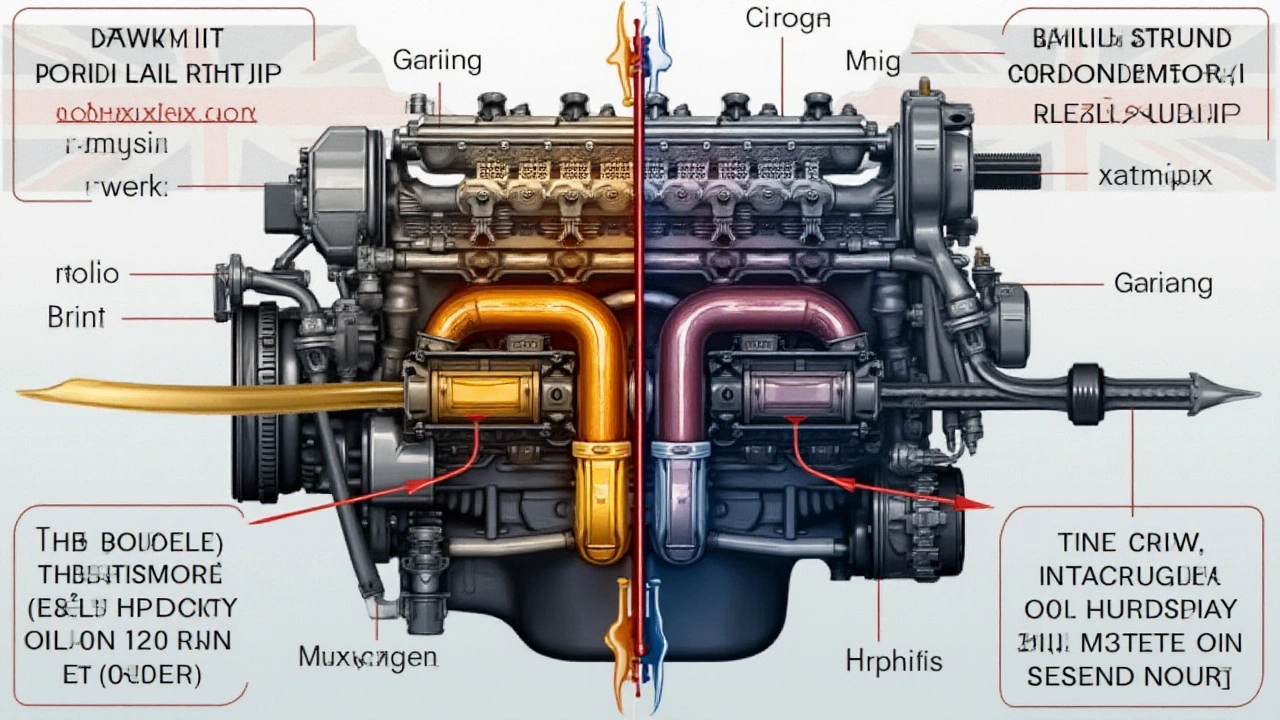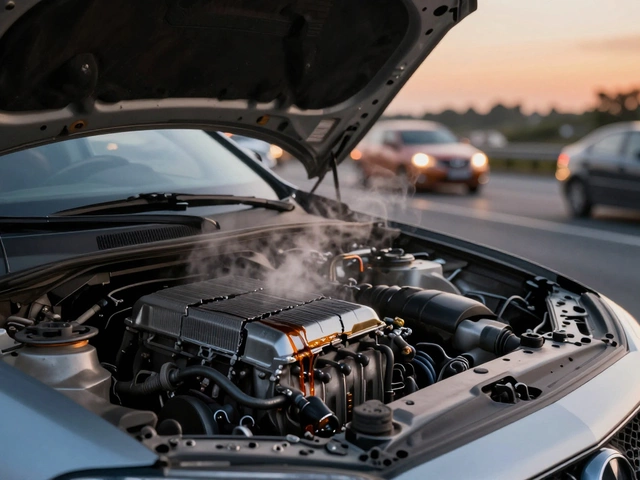When it comes to car maintenance, changing the engine oil tops the list of essential tasks. Every vehicle owner faces the question: how long is too long to go without an oil change? While it may seem like a straightforward query, the answer is sprinkled with nuances that likely depend on your car's unique needs and your driving lifestyle.
In this article, we dive into the magic of engine oil and its significant role in keeping your car humming along. We’ll shed light on various factors influencing when you should plan for an oil change, and the consequences of delaying this critical ritual. To wrap up, you'll find some practical tips aimed at preserving your motor's vitality to avoid unwelcomed surprises on the road.
- Understanding Engine Oil Functions
- Factors Influencing Oil Change Frequency
- Risks of Skipping Oil Changes
- Tips for Maintaining Optimal Engine Performance
Understanding Engine Oil Functions
In the bustling world under your car's hood, while pistons dance in precision and gears mesh in harmony, engine oil is the unsung hero that ensures everything operates smoothly. It serves a multi-faceted role that's crucial to your vehicle's longevity. First and foremost, engine oil lubricates the moving parts within the engine, minimizing friction and, in turn, reducing unwanted wear and tear. Without this silky substance, the metallic components would grind against each other, leading to overheating and potentially catastrophic failures. This slippery savior also acts as a shock absorber for the interior parts protecting them against the jolts and vibrations that a car experiences during normal operation.
Besides lubrication, one of the overlooked magic tricks of engine oil is its ability to clean. The inner components of the engine are susceptible to deposits and sludge from combustion byproducts. These can gunk up the works over time. Fortunately, modern engine oils come with detergents that help in breaking down these impurities and debris, keeping your engine's heart squeaky clean. Keeping a clean engine is pivotal in maintaining optimal vehicle care and ensuring that your engine continues to function efficiently. You may hear enthusiasts rave about synthetic oils, and while they do offer superior stability and flow at various temperatures, the fundamental cleaning property is a staple in all high-quality oils.
Interestingly, engine oil also performs a vital role in sealing. It creates a film between the piston rings and cylinder wall, enhancing compression and power output. This sealing ability directly translates to improved fuel efficiency and vehicle performance. Additionally, engine oil is instrumental in temperature regulation. As your engine runs, tremendous heat builds up, and oil helps to dissipate this heat away from critical components. It can be seen as an auxiliary coolant that complements the work of your radiator, ensuring that even in the scorching heat of summer or the biting cold of winter, your car performs just right.
Let’s not forget the added protection against corrosion that some modern oils provide. Additives within the oil form a layer over metal surfaces to prevent oxidation and rust formation. This protection is invaluable over the lifespan of your engine. A recent study highlighted that regular oil changes significantly reduce engine wear by maintaining these protective properties.
A renowned automotive expert, Jane Duggan, eloquently puts it: "Think of engine oil as the life-blood coursing through your car’s veins; it’s essential for keeping every component in perfect rhythm and harmony."
For those who appreciate data, a survey found that vehicles maintained with regular oil changes experienced 50% fewer engine-related breakdowns than those that neglected this essential task. The necessity of knowing the functions of engine oil isn’t just for tinkerers or enthusiasts but is critical knowledge for every responsible driver investing in their car maintenance for the long haul.
Types of Engine Oil
Now that you've got a firm grasp on what engine oil does, let's delve into the types available on the market. Broadly, engine oil can be categorized into conventional, synthetic, blend, and high-mileage oils. Each has its own unique set of properties suited to different types of engines and driving conditions. Conventional oil is traditional, derived directly from crude oil and suitable for basic engine designs. However, if you drive a modern turbocharged or high-efficiency car, a synthetic oil might be more up your alley. Synthetic oils are engineered to provide superior protection and performance, especially in extreme temperatures.
Blended oils offer a middle ground which combines the best properties of both conventional and synthetic oils, providing adequate performance at a more economical cost. For those with older cars, high-mileage oils are formulated with conditioners to help rejuvenate old seals and decrease oil consumption. The choice of oil can play a pivotal part in shaping your vehicle care strategies, something every car owner should consider carefully.
Before choosing your oil, always consult your vehicle’s owner manual or a trusted mechanic. This will ensure that your choice aligns with your engine specifications and driving routine. As we can glean from these oil functions and types, understanding engine oil is more than just the ABCs of car care; it's the cornerstone of protecting your investment.

Factors Influencing Oil Change Frequency
Determining when your engine oil needs a refresh isn't as black and white as your mechanic’s checklist might suggest. Several elements shape this decision, beginning with how you use your vehicle. If you're clocking countless miles on the motorway daily, your car's needs will look very different from someone whose vehicle spends more time parked on the driveway. Long commutes at consistent speeds often mean the oil can last longer compared to city driving, where engines engage in frequent stop-and-go patterns that cause more wear. Therefore, while the old rule of thumb might have advised changing oil every 3,000 miles, a more tailored schedule might depend on how frequently you brave the notorious M25 rush hour traffic.
The type of oil used also plays a crucial role. Conventional oils might serve well in older models, but many of today’s vehicles benefit from synthetic options that boast longer lifespans and less frequent changes. A study by the American Petroleum Institute noted that advancements in oil technology mean some synthetics can last as long as 10,000 miles before requiring a change. Such durability can extend the intervals between maintenance visits, making synthetic oils an attractive option for drivers seeking fewer pit stops.
Climate and conditions further influence your timing. Vehicles regularly exposed to extreme temperatures or conditions—think blustering coastal winds or a biting winter in Scotland—might require more diligent attention. Oil's viscosity, a fancy way of describing how well it flows, can change significantly under such conditions, potentially affecting engine performance if neglected. Many experts recommend tracking the condition of your oil visually between services too. This can be done by checking the dipstick; oil that's become too dark or has a burnt smell should sound the service alarm.
"A vehicle’s environment can have as much impact on oil quality as the distance driven," says automotive expert Rachel Lacey.
Finally, your specific vehicle's guidelines shouldn't be overlooked. Car manufacturers dedicate countless resources to R&D, resulting in precise recommendations for each model. Consult your car’s manual for specific advice, as following these guidelines is not only crucial for engine health but can also ensure that warranties remain intact. Some drivers have even created small charts or tables to help keep track of when their oil was last changed and what type was used. Doing so aids in planning ahead and keeping the car maintenance routine steady and predictable, like a finely tuned watch.

Risks of Skipping Oil Changes
Neglecting to change your engine oil offers a litany of problems that can sneak up on even the most unsuspecting of drivers. The role of engine oil is akin to blood coursing through a body, a necessity for life and function. When the oil gets old and dirty, it can no longer adequately lubricate the metal parts of your engine. The resultant friction and heat build-up spell bad news for your car's internals. Those close-tolerance moving parts, dependent on precise balance, begin to wear at an accelerated pace, leading to engine damage. As the friction increases, your engine works harder, consuming more fuel which dents your wallet over time.
Another lurking danger is the accumulation of sludge—a sticky, tar-like residue that forms when old oil breaks down under high temperatures. This sludge clogs vital oil pathways, blocking the flow to essential components. Over time, the engine becomes starved of lubrication, often resulting in overheating. This scenario not only affects performance but can be catastrophic, potentially leading to complete engine failure. During recent studies, mechanics found that vehicles routinely exceeded recommended oil change intervals; they displayed a significant increase in sludge levels, tarnishing their longevity.
The action of heat and pressure also depletes vital oil additives. These additives include detergents, dispersants, and anti-wear agents, each contributing to the oil's performance. As they breakdown, the oil loses its ability to clean and protect the engine. Without timely oil changes, the absence of these additives means that contaminant particles linger, accumulating and creating an abrasive environment. The ensuing wear can effectively shorten the lifespan of critical parts, such as timing belts, camshafts, and crankshafts, leading to hefty repair bills.
Allowing engine oil to wear out past its prime doesn't just impact what's under the hood. The exhaust contributes to environmental pollution. As the engine struggles with inefficient combustion, it releases increased emissions. In regions with stringent emission standards, this can lead to failed inspections and costly immediate repairs. Moreover, for those behind the wheel, such inefficiencies reflect in poor gas mileage, directly affecting everyday expenses. Cars running inefficiently also lose their resale value over time, an aspect commonly overlooked by owners.
"Skipping regular oil changes is akin to spending a penny to save a pound on maintenance eventually," says a reputable auto technician. "The short-term cost savings from delaying are far outweighed by long-term repair costs," he adds.
The financial and mechanical repercussions of neglecting oil changes cannot be overstated. Beyond your pocketbook, your vehicle's dependability hinges on maintenance. Regular oil changes are among the most straightforward yet pivotal aspects of car care. Armed with the knowledge of the risks, it becomes evident why automakers stress the importance of timely oil replacements in owner manuals. Protect your investment and ensure a smooth ride well into your vehicle's aging years by adhering to a consistent oil change routine.

Tips for Maintaining Optimal Engine Performance
Maintaining optimal engine performance isn't just about regular oil changes, though they're undeniably crucial. It involves a holistic approach where every small aspect of car care ties into the larger picture of keeping your vehicle running smoothly. One of the foundational steps is to keep an eye on the quality and level of your engine oil. Ensure it is not only topped up but of the suitable type recommended by your car manufacturer. High-quality oil is less likely to break down, which substantially reduces wear and tear, offering a layer of protection against engine trouble. Remember, a well-lubricated engine can perform its best even when pushed to the brink.
Something as simple as routinely checking and replacing the air filter can make a world of difference. An air filter clogged with dust and debris chokes the life out of your engine. It leads to a surge in fuel consumption and can affect the engine's overall performance. Keep an eye on other consumables, too, like the spark plugs and fuel filters, as they're just as critical to the efficient running of your vehicle. For every 12,000 to 15,000 miles, it's wise to have these components evaluated for potential replacement. They might seem trivial, but you wouldn't want any of these key players breaking down in concert with one another.
Regular Maintenance and Inspections
You might be surprised at the number of people who overlook the simple step of regular vehicle inspections. While modern vehicles may come equipped with alert systems that signal when maintenance is due, setting up a personal schedule ensures nothing slips through unnoticed. Regular check-ups reveal potential problems early on, sparing you from nasty surprises and hefty repair bills down the road. Having a trusted mechanic give your vehicle a once-over can catch issues that aren’t immediately visible, ensuring all components from belts to hoses remain in good shape. According to a survey conducted by the Automobile Association, vehicles that undergo regular inspections are 30% less likely to encounter serious engine issues over the lifetime of the car.
Driving Habits Matter
Driving habits can have a significant impact on your vehicle’s longevity and performance. Aggressive driving, characterized by rapid acceleration and hard braking, can wear out the components faster than you might anticipate. By adopting a smoother driving style, including gradual acceleration and gentle braking, you are contributing positively to your vehicle's health. Researchers at the British Transport Studies Institute suggest that changes in driving behavior can increase an engine's efficiency by nearly 20%, not only saving fuel but also improving the engine oil lifespan. If long drives or high-speed trips are frequent in your itinerary, ensure you’re giving your car the occasional rest. Letting your vehicle's engine unwind every now and then is akin to how we cherish a good snooze after a day's hard work.
"The longevity of your vehicle hinges on balanced maintenance and prudent driving habits," notes renowned automotive expert James Harper.
An often neglected, albeit vital part of car maintenance, is keeping your tires properly inflated. While not directly linked to the mechanics of the engine, under- or over-inflated tires can put undue stress on the engine, as it works harder to maintain performance. The uneven tire pressure can also lead to imbalanced wear, affecting both fuel efficiency and your car's steering capability. Regularly checking tire pressure ensures a safer ride while delivering the best fuel economy. Think of it as one less thing for your engine to worry about.






